Accelerate > Publications
Search this online library featuring the latest FAO publications, issue papers and briefs which offer up-to-date knowledge and innovative insights for SDG acceleration.
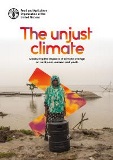
The unjust climate: Measuring the impacts of climate change on rural poor, women and youth
2024
This report assembles an impressive set of data from 24 low- and middle-income countries in five world regions to measure the effects of climate change on rural women, youths and people living in poverty. It analyses socioeconomic data collected from 109 341 rural households (representing over 950 million rural people) in these 24 countries. These data are combined in both space and time with 70 years of georeferenced data on daily precipitation and temperatures.
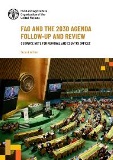
FAO and the 2030 Agenda Follow-up and Review: Guidance Note for Regional and Country Offices
2023
The Guidance Note describes the process of the preparation of the VNRs and what FAO Regional and Country Offices need to be aware and mindful of when providing support to the national partners. It covers information about the importance of the follow-up and review process for the 2030 Agenda and the SDGs, including information about the gaps in the coverage of the Voluntary National Reviews, and recommendations on strengthening VNRs to be meaningful instruments for the acceleration of the SDGs.
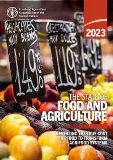
The State of Food and Agriculture 2023 - Revealing the true cost of food to transform agrifood systems
2023
The State of Food and Agriculture 2023 looks into the true cost of food for sustainable agrifood systems. The report introduces the concept of hidden environmental, health and social costs and benefits of agrifood systems and proposes an approach – true cost accounting (TCA) – to assess them.
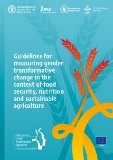
Guidelines for measuring gender transformative change in the context of food security, nutrition and sustainable agriculture
2023
These Guidelines include step-by-step guidance to formulate qualitative and quantitative indicators of gender transformative change to help gender experts and food security, agriculture and nutrition programme specialists in their efforts to design, implement, monitor and evaluate gender transformative interventions. These indicators should be distinctive from and a complement to other reach, benefit and empower indicators intended to contribute to gender equality outcomes in food security,...
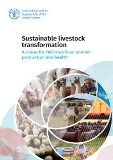
Sustainable livestock transformation. A vision for FAO’s work on animal production and health
2023
Within the framework of the United Nations 2030 Agenda for Sustainable Development, FAO assists Member Nations to improve sound policies, increase investments and develop good practices in the livestock sector.
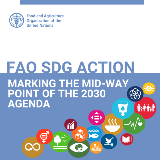
FAO SDG Action: Marking the mid-way point of the 2030 Agenda
2023
As we stand at the midpoint of the 2030 Agenda, it is both a moment of reflection and an opportunity to renew our commitment to achieving the SDGs. In August 2023, the FAO Office of SDGs launched a survey, receiving over 600 responses that shared valuable insights, experiences and actions taken by FAO offices towards the achievement of the SDGs. In addition this survey, FAO project data was leveraged to present this visual representation of FAO’s contribution to the 2030 Agenda implementation.
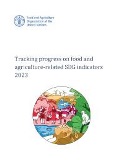
Tracking progress on food and agriculture-related SDG indicators 2023
2023
At the mid-point of the Agenda 2030 for Sustainable Development, there is an urgent need to understand where the world stands in eliminating hunger and food insecurity, as well as in ensuring sustainable agriculture. The new report of the Food and Agriculture Organization of the United Nations (FAO),offers analysis and trends on indicators across eight Sustainable Development Goals (SDGs) – in particular, SDGs 1, 2, 5, 6, 10, 12, 14 and 15.
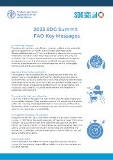
2023 SDG Summit: FAO Key Messages
2023
The 2023 SDG Summit will serve as a pivotal event towards achieving the SDGs, as gathered Heads of State and Government are to carry out a comprehensive review of progress, respond to the impact of multiple crises, and provide high-level political guidance on transformative and accelerated actions for achieving the 2030 Agenda. FAO has developed these key messages to inform the discussions in the lead up to and during this Summit and the Political Declaration which will result from them.
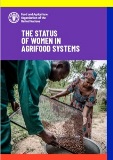
The status of women in agrifood systems
2023
This new FAO report provides a comprehensive picture of the status of women not only in agriculture, but across agrifood systems. It presents extensive data and lessons learned about gender in agrifood systems, with particular focus on how women participate in and benefit from socio-economic opportunities.
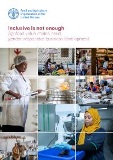
Inclusive is not enough – Agrifood value chains need gender-responsive business development
2023
This brief, jointly developed by the FAO Regional Office for Africa and the FAO Regional Office for the Near East and North Africa, aims to trigger a critical reflection on the concept of “inclusive” agribusiness and propose a new definition that highlights the importance of considering gender equality and women’s empowerment as an integral component of agribusiness development.
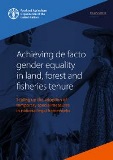
Achieving de facto gender equality in land, forest and fisheries tenure - Scaling up the adoption of temporary special measures in national legal frameworks
2022
This legal paper first considers the obligations of states in relation to gender equality and the adoption of temporary special measures, and the work of the Convention on the Elimination of All Forms of Discrimination Against Women (CEDAW) Committee in clarifying and expanding the concept of temporary special measures.
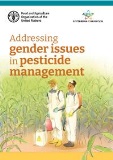
Addressing gender issues in pesticide management
2022
The Rotterdam Convention Secretariat (NSPRD) and the Gender team in ESP developed this publication with the objective of highlighting the gender-related implication of pesticide use and management, focusing on the role of women in handling hazardous pesticides in agriculture, the reasons why they are at higher risk and the health-related implications they face. The brochure provides an overview of how FAO addresses the topic ...
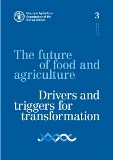
The future of food and agriculture – Drivers and triggers for transformation
2022
This report aims at inspiring strategic thinking and actions to transform agrifood systems towards a sustainable, resilient and inclusive future, by building on both previous reports in the same series as well as on a comprehensive corporate strategic foresight exercise that also nurtured FAO Strategic Framework 2022–31. It analyses major drivers of agrifood systems and explores how their trends could determine alternative futures of agrifood, socioeconomic and environmental systems.
Tracking progress on food and agriculture-related SDG indicators 2022
2022
Seven years into the 2030 Agenda, there is an urgent need to understand where the world stands in eliminating hunger and food insecurity, as well as in ensuring sustainable agriculture. FAO’s new report, “Tracking progress on food and agriculture-related SDG indicators”, offers analysis and trends on indicators across eight SDGs (1, 2, 5, 6, 10, 12, 14 and 15), highlighting areas of progress and areas where further effort is needed.
Tracking progress on food and agriculture-related SDG indicators 2021
2021
The devastating COVID-19 has already shaken the 2030 Agenda for Sustainable Development to its very core and, as it continues, the full effect on the progress towards the achievement of the Sustainable Development Goals (SDGs) is still to be determined. The High-Level Political Forum noted that the world is “off track” to meeting the SDGs. The COVID-19 pandemic might have pushed an additional 83-132 million into chronic hunger in 2020.
Tracking progress on food and agriculture-related SDG indicators 2020
2020
In September 2019, the High Level Political Forum noted that the world is “off track” to meeting the Sustainable Development Goals. This echoed the main finding of the first edition of this report, issued in July 2019, that the world was not going to meet most of the food and agriculture-related SDG targets by 2030. Now, due to COVID-19, an unprecedented health, economic and social crisis is threatening lives and livelihoods, making the achievement of these targets even more challenging.
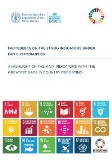
Factsheets on the 21 SDG indicators under FAO custodianship: A highlight of the main indicators with the greatest gaps in country reporting
2020
This booklet introduces a series of individual factsheets that contain the main characteristics of each of the 21 SDG indicators under FAO custodianship, including their main methodological approach, relevance for the target, limitations, main challenges for country reporting and ways to overcome these.
Browse by SDG
- SDG1: No Poverty
- SDG2: Zero Hunger
- SDG3: Good Health & Well-being
- SDG4: Quality Education
- SDG5: Gender Equality
- SDG6: Clean Water & Sanitation
- SDG7: Affordable and Clean Energy
- SDG8: Decent Work and Economic Growth
- SDG9: Industry, Innovation and Infrastructure
- SDG10: Reduced Inequalities
- SDG11: Sustainable Cities and Communities
- SDG12: Responsible Consumption and Production
- SDG13: Climate Action
- SDG14: Life Below Water
- SDG15: Life on Land
- SDG16: Peace, Justice and Strong Institutions
- SDG17: Partnerships for the Goals
Browse by Better
Browse by Priority Area
- Innovation for Sustainable Agriculture Production
- Blue Transformation
- One Health
- Small-Scale Producers' Equitable Access to Resources
- Digital Agriculture
- Healthy Diets for All
- Nutrition for the Most Vulnerable
- Safe Food for Everyone
- Reducing Food Loss and Waste
- Transparent Markets and Trade
- Climate Change Mitigating and Adapted Agrifood Systems
- Bioeconomy for Sustainable Food and Agriculture
- Biodiversity and Ecosystem Services for Food and Agriculture
- Achieving Sustainable Urban Food Systems
- Gender Equality and Rural Women's Empowerment
- Inclusive Rural Transformation
- Agriculture and Food Emergencies
- Resilient Agrifood Systems
- Hand-in-Hand Initiative
- Scaling up Investment
